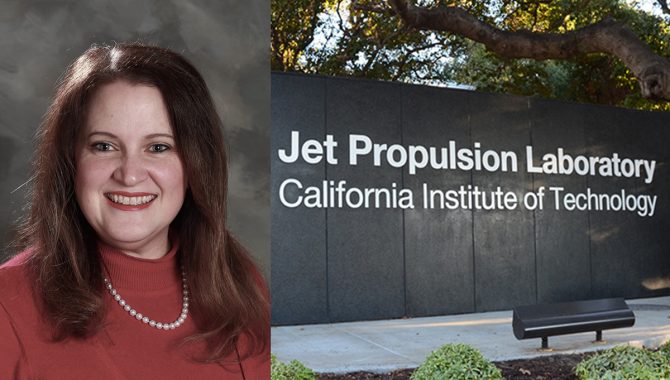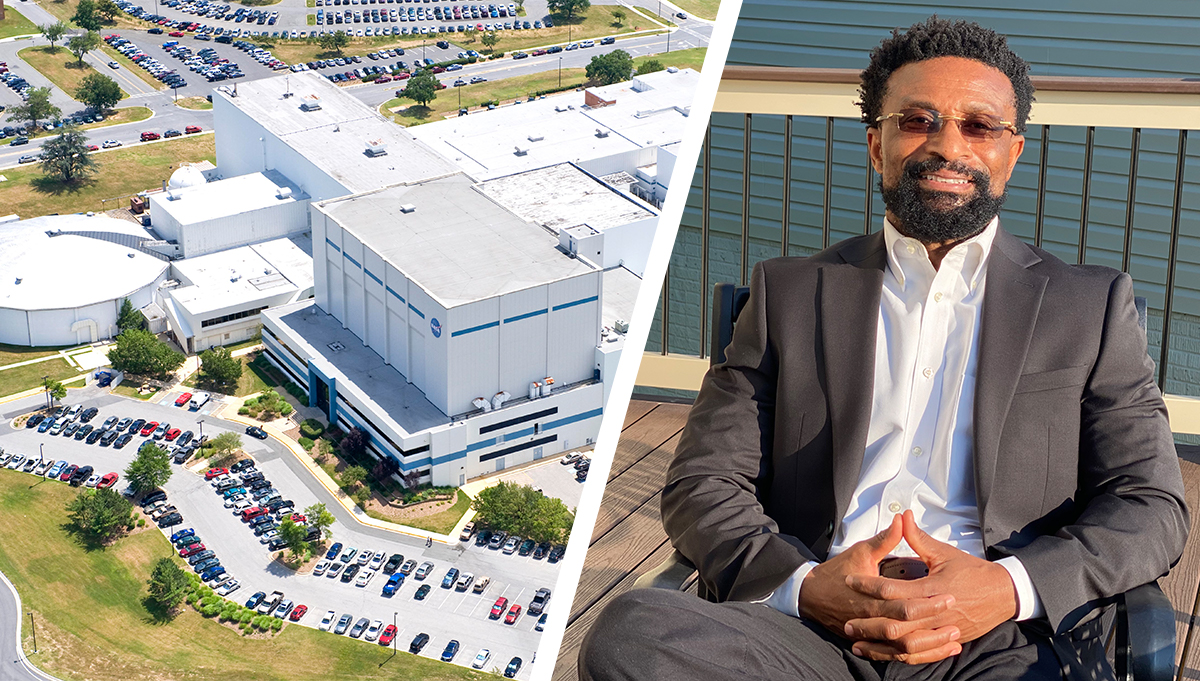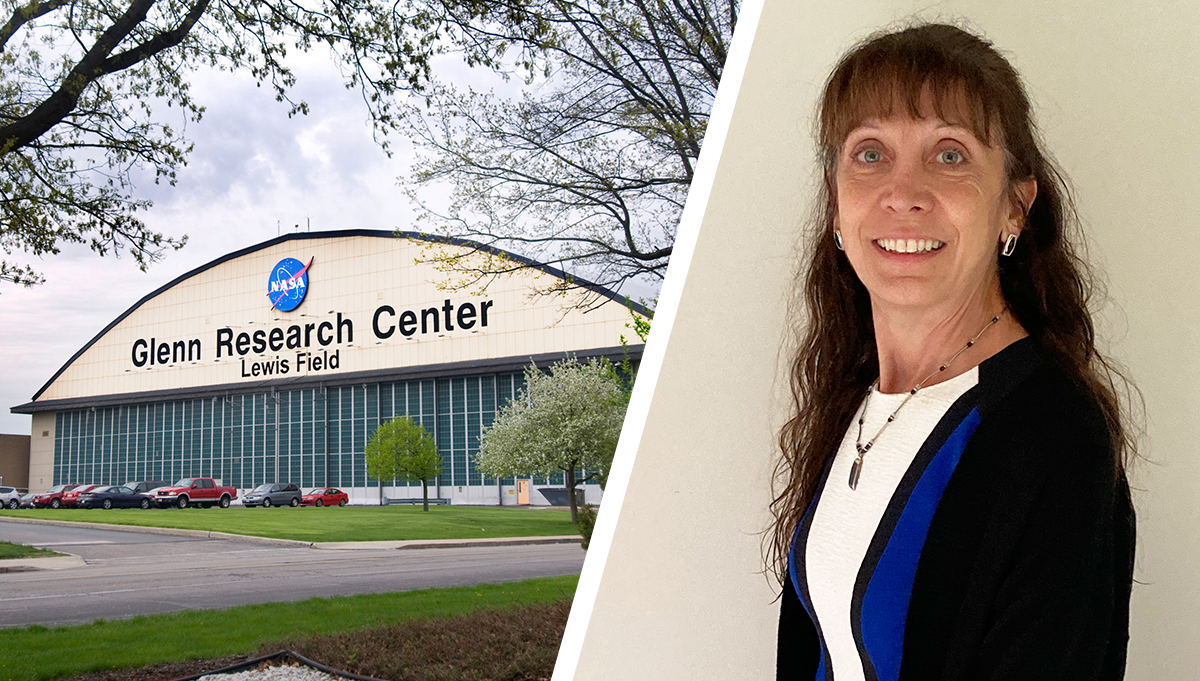
JPL CKO Michelle Drabik.
Credit: NASA
Michelle Drabik discusses knowledge sharing at NASA’s Jet Propulsion Laboratory.
Michelle Drabik serves as the Chief Knowledge Officer (CKO) for NASA’s Jet Propulsion Laboratory (JPL). JPL, the leading U.S. center for robotic exploration of the solar system, is a federally funded research and development center managed for NASA by Caltech. As CKO, Drabik serves the entire lab and reports to both the Office of the Chief Engineer and the Enterprise and Information Systems Engineering Section.
Prior to joining JPL, she was Senior Manager of Intellectual Capital Management at Honeywell UOP in Chicago, serving the companies in the Performance Materials and Technologies Division. Drabik directed the work of Knowledge and Library Services; Intellectual Property Support; R&D Training, Onboarding and Six Sigma; and Data Analytics. The majority of her career was with Energizer in Cleveland, where she served as Technical Services Manager and directed work of the global Library (including library services, KM, information management engineering, and competitive intelligence efforts), Analytical Sciences, Alkaline Battery Pilot Line, and several testing labs. She started her career as a chemist designing “blue sky” batteries before transitioning to information systems and knowledge management.
What are your thoughts on how knowledge sharing affects mission success?
NASA has long been recognized as a model of excellence for generating, sharing and application of lessons learned. Especially when the lesson is the result of a failure, it takes courage and honesty to share what we failed to know. That is a particular strength for the NASA community: putting mission success first through relentless commitment to sharing knowledge, even when it is uncomfortable. At the core of good science is adapting as more becomes known, so this culture of knowledge sharing is part of NASA’s secret sauce for constantly delivering the impossible.
Are there any successful knowledge efforts or best practices in your organization that you’d like to highlight?
We have a number of efforts in progress, but an interesting and important one I’d like to highlight is JPL’s Institutional Knowledge Graph, led by Daria Topousis, Content Services Program Manager in the Information Technology and Solutions Directorate. The knowledge graph interconnects information from a variety of gold sources to illustrate and draw inferences from the complex relationships between them. Right now, you can query it by starting with a person, organization, record type, or location and visualize relationships among these topics and data associated with them. As it develops, the knowledge graph will be used to derive answers to previously hard-to-answer questions like ‘Who are JPL’s experts in autonomous systems?’ and visualize the array of connections leading to that result. The knowledge graph is a key foundational element to enabling smart discovery and analysis and will inform other applications. The knowledge office participates on the action and advisory teams.
What are some of the most prominent knowledge challenges in your organization?
A top prominent challenge to knowledge management at JPL is the increasing volume and intensity of project and mission work reducing the time for employees to capture knowledge. While employees focus efforts on delivering the mission on plan, there is a shrinking amount of time left to reflect on and capture project knowledge that will inform future efforts. The exception is capturing lessons learned, which is a requirement. We need to find better ways to give due priority to capturing knowledge without compounding stress on those working to deliver projects. Currently, we are examining ways to blend knowledge capture with preparing gate documentation as a first step to resolving this issue. Like many other organizations, we also face the challenges of preventing knowledge loss due to the retirement bubble and connecting information silos.
Are you observing any trends or cultural shifts that affect knowledge management going forward?
Until the pandemic, we saw many news stories about America’s business leaders eliminating remote work. As the pandemic forced massive and rapid transition to remote work, JPL’s strong work ethic and culture proved to be a sturdy foundation for a smooth transition with continued high productivity: Perseverance launched on schedule, an ad hoc team designed a COVID-19 ventilator in 37 days, etc. In the continuing and post-pandemic world, remote work will likely rise again among the U.S. workforce. This change will bring about improvements and offerings in smart systems and applications, enabling new options for generating, capturing, discovering and sharing knowledge through a distributed workforce. However, a substantial remote workforce also will present challenges to building and sustaining the kind of trust relationships, communities of practice, and impromptu knowledge exchange that have traditionally been fostered by in-person, often incidental, interactions. Work cultures will change and approaches to knowledge transfer must be reimagined.
What impact are technologies such as machine learning (ML) and artificial intelligence (AI) beginning to have on your knowledge sharing activities?
At JPL, significant work is underway to enhance discovery using a number of technologies based on AI/ML. I expect to see a shift in the Data → Information → Knowledge pyramid in which a substantial amount of data is analyzed and presented as information and insights without human intervention, allowing knowledge workers to focus their efforts closer to the top of the pyramid.
What’s the biggest misunderstanding that people have about knowledge?
The biggest misconception people have about knowledge is that it is the same as information and is managed the same way. Knowledge management and information management are interdependent, but different. Knowledge can only be created and reside in a brain. Once it comes out, it is information again. Therefore, knowledge management is about optimizing conditions to encourage learning (which generates knowledge) and sharing (through application, explanation, recording or demonstration) to deliver real or potential value to the organization. Information management is related to KM because it delivers inputs to the learning process and enables deployment and storage of the outputs of knowledge generation, usually via digital systems. This is why people, not systems, are at the heart of KM, while systems, though increasingly designed around human factors, are at the heart of information management.









